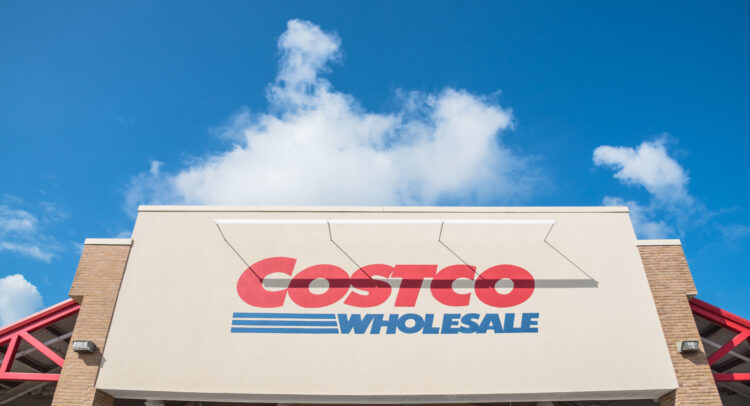Costco Wholesale Corporation (NASDAQ:COST) has long been a Wall Street sensation, sustaining an unstoppable momentum. The retail behemoth operating 871 membership warehouses has seen its stock rise by about 44% over the past year, continuing its long-term market outperformance. While shares appear grossly overvalued, it’s worth recalling that this has been a consistent theme in the case of Costco. Thus, the recent rally doesn’t necessarily signal downside potential. I am neutral on the stock.

Why is Costco Stock a Wall Street Darling?
Costco’s remarkable surge in the past year can be attributed to its status as a Wall Street darling, consistently attracting significantly higher valuation multiples versus its industry peers. To provide some context, here’s Costco’s current forward P/E compared to other retailers:
- Costco’s: 35.9
- Walmart’s (NYSE:WMT): 22.7
- Dollar Tree’s (NASDAQ:DLTR): 18.8
- Dollar General’s (NYSE:DG): 17.6
- BJ’s Wholesale Club’s (NYSE:BJ): 16.4
- Target Corporation’s (NYSE:TGT):15.1
As you can see, it becomes evident that Costco stock stands out as distinctly pricier than its peers. The interesting thing, though, is that this is not a new theme when it comes to Costco stock. Shares of the wholesale giant have always come attached to a premium valuation. In fact, there hasn’t been a single day over the past decade that Costco has traded at a cheaper valuation than any of the aforementioned industry peers.
In my view, this theme is set to be sustained, driven by Costco’s distinctive qualities, the most influential of which I highlight below.
A Robust Track Record of Operating Excellence
The most significant quality that makes Costco stand out in the retail space is its remarkable track record of consistent operating excellence. To illustrate, aside from a slight dip in revenues in 2009, Costco has consistently managed to grow its revenues every year since 1992—this being the extent of the publicly available data that I have access to.
Remarkably, Costco has consistently delivered profitable results, maintaining an impressive track record without a single unprofitable year since that period. Moreover, despite the company’s well-established status and decades of significant growth, its momentum remains remarkably robust. In particular, the company’s revenues and net income have demonstrated a remarkable compound annual growth rate (CAGR) of 8.7% and 11.8%, respectively, over the past decade.
Membership Model Retains Customers, Reduces Cash-Flow Volatility
Another factor that has contributed to Costco’s evolution into a Wall Street darling is its membership-based business model. By implementing an annual membership fee, the company grants members exclusive access to its extensive network of warehouses and its online platform.
This rather innovative mechanism from the wholesaler translates to customer retention, as it compels its members to consistently choose Costco to fully leverage the exclusive benefits tied to their membership. Simultaneously, the predictability of revenue generated through this model reduces Costco’s cash-flow volatility and contributes significantly to its long-term profitability.
Note that Costco strives to offer products with a more competitive pricing strategy than its counterparts. Occasionally, the company may even operate at a breakeven point or a minimal profit margin when selling certain products. Costco’s primary revenue source, however, lies in its membership fees.
By ensuring unmatched affordability that customers cannot find elsewhere, Costco establishes itself as the preferred choice. This fosters a win-win relationship for Costco and its customers while also making for a notable moat in what is a very competitive industry. Thus, you can see why its unique business model holds strong appeal for investors.
Global Replication of Costco’s Business Model Holds Massive Potential
Another element contributing to Costco’s sustained rally and premium valuation is the company’s abundant growth potential. Costco can fully realize this potential by replicating its industry-leading business model globally.
Costco’s impressive history of thriving international expansion, spanning diverse countries such as Canada, Australia, Mexico, Japan, France, Spain, Taiwan, Korea, and the United Kingdom, among others, serves as a testament to its adeptness in navigating and capitalizing on global opportunities.
To underscore Costco’s untapped potential, it’s noteworthy that the company currently operates with only one warehouse in New Zealand and Iceland, one in Sweden, and a modest two in France, along with four in Spain. Furthermore, in China, Costco has just five warehouses, presenting a remarkable opportunity for substantial growth, given the vast economies of scale inherent in the country’s size and population.
Thus, you can see why investors try to price in such strong future growth prospects in today’s stock price, which explains today’s premium valuation.
What is the Price Target for COST Stock?
Turning to Wall Street, Costco stock features a Moderate Buy rating based on 20 Buys and seven Hold ratings assigned in the past three months. The average COST stock forecast of $658.93 implies 0.9% downside potential, nonetheless.
If you’re wondering which analyst you should follow if you want to buy and sell COST stock, the most accurate analyst covering the stock (on a one-year timeframe) is Mark Astrachan from Stifel Nicolaus, with an average return of 23.94% per rating and a 95% success rate.

The Takeaway
Costco’s relentless ascent on Wall Street, marked by a nearly 50% stock surge in the past year, underscores its enduring appeal. While the shares may seem steeply valued, this isn’t a novel scenario for the retail giant.
The premium is justified by Costco’s unparalleled operating excellence, membership-driven stability, and a global expansion strategy showcasing vast untapped potential. As the company continues its thriving trajectory, investors are likely to find solace in Costco’s proven ability to navigate and capitalize on both domestic and international opportunities.
While the stock may appear to carry a premium valuation, it would be unwise for investors to overlook the promising prospect of Costco’s expansive potential. The trajectory of robust earnings growth suggests that the company could very well justify and grow into its current valuation, as has always been the case in Costco’s history.
















